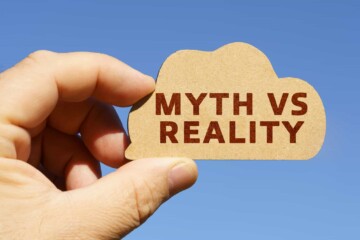For many of us, coffee is the reason we get out of bed every day! The alarm goes off on a cold, dark morning and the only thing which makes getting up thinkable is the thought of that first hot cup of coffee. So, is coffee bad for you if you have PCOS? If you’re currently begging: ‘please tell me no!’ …we hear you! You aren’t alone. Coffee is one of the most popular drinks in the world and its part of many people’s daily routine. However, if you have PCOS, you may have to consider whether the amount of caffeine you’re consuming is making your PCOS symptoms worse. But before you resign yourself to drinking joyless decaf skinny lattes forevermore, let’s look at the scientific research and take some notes.
Does drinking coffee make PCOS symptoms worse?
There’s conflicting advice out there when it comes to PCOS and caffeine. Some say that caffeine aids weight loss, which in turn is helpful for managing PCOS symptoms. Other advice says that high caffeine consumption aggravates hormonal imbalances. High levels of caffeine have been said to make your PCOS symptoms worse by:
- Increasing the stress hormone cortisol, which raises insulin, which suppresses progesterone production.
- Increasing sugar cravings (when you’re on a low after having a caffeinated coffee earlier, you often crave a sugar boost).
- Increasing blood pressure (which could potentially increase insulin, causing more inflammation).
- Losing more water-soluble vitamins such as B2, B3, B5, and B6 which are useful for controlling weight (as coffee is a diuretic).
How does coffee impact insulin levels?
Women with PCOS are often insulin resistant and have metabolic disorders (the hormone insulin helps the body to control blood sugar). But as for the impact of coffee on insulin levels, due to coffee being a mix of caffeine and other properties, this isn’t clear-cut.
Research on people with diabetes type 2 has found that caffeine may hamper insulin sensitivity, but other properties in coffee have the opposite effect. It’s important to note that insulin resistance in PCOS isn’t the same as diabetes, so although research on insulin and coffee in relation to diabetes type 2 is compelling, it can’t be directly applied to those with PCOS (unless you have type 2 diabetes as well).
A study in 2021 actually found that the mix of caffeine and polyphenols in coffee resulted in it being beneficial in maintaining metabolic homeostasis in women with PCOS.
How does coffee affect the adrenal glands?
Another side effect of PCOS is that your adrenal glands can over-produce stress hormones like cortisol. Caffeine has been shown to increase the production of cortisol. Many of us reach for a coffee when we are feeling stressed, but this shows that isn’t a good idea. It’s actually best to avoid caffeine during a spike in cortisol as it’s only going to increase the cortisol further. Too much cortisol can affect your sleep, mood and oestrogen levels negatively.
Does coffee lead to hormone imbalances?
Many different hormones are secreted by the endocrine system glands, including testosterone and oestrogen, cortisol and insulin. As we have discussed, coffee can influence these hormones, leading to an imbalance as more or less of a hormone is secreted. In some instances, caffeine can be making these hormonal imbalances worse — but there is one way it could be helping. Caffeinated drinks have been associated with improving SHBG (Sex Hormone Binding Globulin) production. PCOS is associated with low levels of SHBG. Low levels of SHBG lead to high testosterone, oestrogen in the blood and dihydrotestosterone. What’s more, low levels of SHBG are associated with insulin resistance. And an imbalance of SHBG is also linked to metabolic dysregulation, something that those with PCOS battle with.
A study found that drinking coffee increases the level of SHBG. And as an added benefit, the results also showed that coffee drinkers were 56% less likely to develop type 2 diabetes than non-coffee drinkers.
Does coffee affect fertility for those with PCOS?
Although the NHS confirms that there is no evidence that coffee affects fertility, when trying to conceive with PCOS, infertility can be down to hormonal imbalance that leads to a lack of ovulation. So sleeping well and preventing stress can help your body because coffee can hinder good sleep and increase the stress hormone cortisol.
And while the NHS doesn’t link caffeine to fertility problems, they do advise women who are pregnant to decrease their caffeinated coffee consumption. This is because there is evidence to suggest that caffeine is linked to a higher risk of miscarriage. PCOS already puts you at a higher risk of miscarriage, so when pregnant it is advisable to limit your coffee intake or just drink decaf.
One study shows women who consumed more than 200mg a day of caffeine doubled their risk of having a miscarriage.
Should you stop drinking coffee if you have PCOS?
If you feel like caffeine is negatively impacting your health and you feel a bit jittery, then consider decreasing the number of cups of coffee you have per day. You can also switch to decaf coffee as an experiment, but in this case, you’ll have to watch out for initial signs of withdrawal, such as headaches (these will pass with time). If you do need a cup of caffeinated coffee, drink it in the morning and then swap to decaf to prevent problems sleeping. You can also stick to black coffee as milk and sugar can spike your blood sugar levels.
In Summary
To conclude, there are pros and cons to drinking coffee when you have PCOS. But women have different bodies and different lifestyles, so while one woman feels best on one or two cups of coffee a day, another might feel better cutting out coffee altogether and making a swap to herbal tea. Whatever your needs, your caffeine intake is definitely something to consider, especially if you’re trying for a baby.
References
Cornelis, M C et al. Metabolomic response to coffee consumption: application to a three-stage clinical trial. Journal of Internal Medicine. June 2018.
Lovallo, William R. et al. Cortisol responses to mental stress, exercise, and meals following caffeine intake in men and women. Pharmacology Biochemistry and Behavior. Volume 83, Issue 3, March 2006, Pages 441-447.
Weng, Xiaoping. Maternal caffeine consumption during pregnancy and the risk of miscarriage: a prospective cohort study. Research Obstetrics| Volume 198, Issue 3, March 2008.








